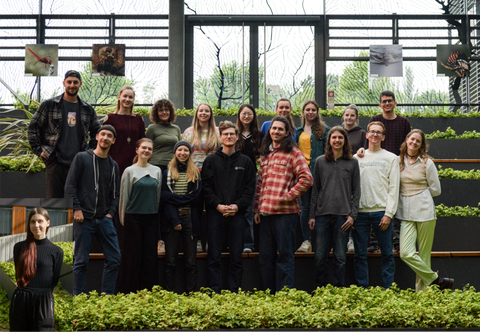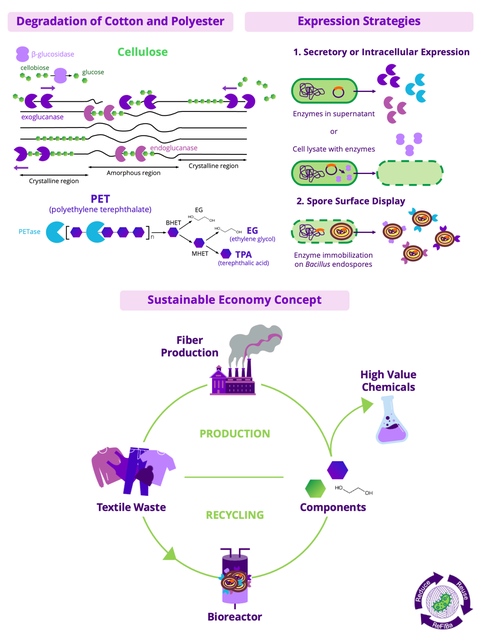Dec 11, 2024
ReFiBa Project: TU Dresden Team Wins Gold at 2024 iGEM with Innovative Textile Recycling Solution
An innovative team of 18 students from TU Dresden has claimed the gold medal at 2024 iGEM (International Genetically Engineered Machine) competition. Their project, which aims to recycle textile fibres by using Bacillus subtilis, also earned the team two additional nominations: Best Fashion & Cosmetics Project (for both undergraduate and overgraduate categories) and Best New Composite Part (overgraduate). These awards highlight the project’s potential to reshape sustainable practices in the fashion industry.
In 2024, iGEM competition brought together over 400 teams worldwide, challenging students to independently develop and implement biotechnological solutions under the slogan, “Local people solve local problems all over the world”. The ReFiBa project was developed to address the critical environmental challenge posed by textile waste, which amounts to over 92 million tons globally each year, with only 10% being recycled.
The ReFiBa project provides an innovative solution for recycling mixed textiles, in particular cotton-polyester, which can be structurally regarded as cellulose and polyethylene terephthalate (PET). The team chose Bacillus subtilis as an expression host of cellulases and PETases.
“We explored two different approaches for protein production in this project.” explained Jenny Sauermann, the lab project manager of the team, “The first approach focused on secreting the enzymes into the surrounding environment, which simplifies downstream processing but reduces the stability of the enzymes. In this approach, we found suitable candidates for our project. The second approach involved immobilizing the PETases and cellulases on the surface of Bacillus subtilis spores, which might enhance enzyme stability and reusability, especially under harsh industrial conditions.”
Ideally, PET and cellulose are degraded respectively to ethylene glycol (EG), terephthalic acid (TPA) and glucose. TPA can be removed from the solution by acid precipitation, while EG and glucose can be further fermented to produce high value chemicals. These valuable products can be efficiently extracted and repurposed, transforming textile waste into a source of sustainable chemicals for a wide range of industrial applications.
Formed in October 2023, the ReFiBa project team consists of 18 dedicated students from various disciplines, including Biology in Society, Biochemistry, Molecular Biosciences and Productive Biosystems, Molecular Biology and Biotechnology, Bioprocess Engineering, and Media Computer Science, all united by a commitment to environmental sustainability. “Each of us contributed unique skills to address different facets of this project, making ReFiBa a true collaborative effort,” explained Aaron Anselmi, one of the student leaders. "Our goal is to lead the way towards a sustainable economy in which textile waste can be transformed into a valuable resource."
Further details of the ReFiBa project: https://2024.igem.wiki/tu-dresden/index.html
Team members: Aaron Anselmi, Cosima Sagurna, Lilli Kratzer, Tatiana Khorovich, Katrin Lehmann, Lucas Kullmann, Paula Müller, Matti Lehmann, Josephine Borbas, Rico Steinert, Julia Schmidt, Wenjing Tao, Jenny Sauermann, Gabriel Pinto, Linda Krause, Max Herrmann, Lukas Minack, Sophie Zieschang
Instructors: Prof. Dr. Thorsten Mascher, Dr. Christoph Loderer
Contact:
Thorsten Mascher
Professor of General Microbiology
TU Dresden
Email:
Tel.. +49 351 463-40420
About iGEM
International Genetically Engineered Machine (iGEM) is a global synthetic biology competition where teams of students from universities, high schools, and research institutions come together to tackle real-world problems through innovative biotechnological solutions. The competition began in 2004 and has since grown to involve over 400 teams from around the world. Teams develop projects that span a variety of disciplines, using genetic engineering to design, build, and test systems that can address environmental, health, and societal challenges.


